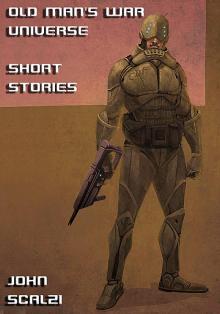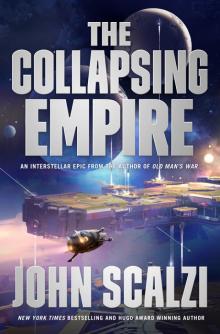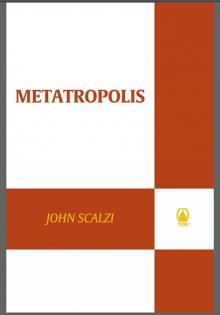- Home
- John Scalzi
The Consuming Fire (The Interdependency) Page 3
The Consuming Fire (The Interdependency) Read online
Page 3
Rachela, already the public and spiritual face of the Interdependency, was selected by (carefully orchestrated) acclamation as the first “emperox.” This new gender-neutral title had been chosen because market testing showed that it appealed to nearly all market segments as a fresh, new, and friendly spin on “emperor.”
This compact and highly elided history of the formation of the Interdependency may make it appear as if no one questioned the lie—that billions of people uncritically swallowed the fiction of Rachela’s prophecies. This was not at all accurate. People did question the lie, to the same amount as they would question any bit of pop spirituality marching toward an actual religion, and became alarmed as it gained acceptance, and followers, and respectability. Nor were observers of the time blind to the machinations of the Wu family as it made its play for imperial power. It was the focus of many handwringing editorials, news shows and occasionally attempted legislative action.
What the Wu family had over them was organization, and money, and allies in the form of the other now-noble families. The formation of the Holy Empire of the Interdependent States and Mercantile Guilds was a charging musk ox, and the skeptical observers were a cloud of gnats. Neither did much damage to the other, and in the end there was an empire.
One other reason the lie worked is that once the Interdependency formed, the Prophet-Emperox Rachela declared her visions and prophecies had largely come to an end, for now. She devolved all functional power in the administration of the Interdependent Church to the archbishop of Xi’an and a committee of bishops, who knew a good deal when they saw one. They rapidly built an organization that shoved the explicitly spiritual aspect of the church to the side, to be the spice of the new religion, not its main course.
In other words, neither Rachela nor the church overplayed its spiritual hand in the critical early years of the Interdependency, when the empire was necessarily at its most fragile. Rachela’s imperial successors, none of whom added the “prophet” part of the title to their address, largely followed her example, staying out of church business except for the most ceremonial parts, both to the relief, and then as the centuries passed, to the expectation, of the church itself.
The lie of Rachela’s visions and prophecy was never acknowledged by the church, of course. Why should it have been? To begin, neither Rachela nor the Wu family ever explicitly said outside of family conferences that the spiritual side of the Interdependent Church was wholly concocted. One could not expect Rachela’s successors, either as emperox or in the church, to own up to it, or even to publicly air their own suspicions and undermine their own authority. After that it was simply a matter of waiting until the visions and prophecy became doctrine.
For another thing, Rachela’s visions and prophecies largely came true. This was a testament to the fact that the “prophecy” of the Interdependency, while expansive, was also practically achievable, if one had ambition, money, and a certain amount of ruthlessness, all of which the Wu family had, in bulk. Rachela’s prophecies did not ask people to change the way they lived, in the small-bore, everyday sense. It just asked them to swap out their system of governance, so that those at the very very top could have even more power, control and money than they had before. As it turned out, this was not too much to ask.
Finally, as it happened, the Wu family wasn’t wrong. Humanity was widely dispersed, and of all the star systems that the Flow was known to touch, only one of them had a planet capable of sustaining human life in the open: End. All the humans in all the other systems lived in habitats on planets, moons, or floating in space, all monstrously vulnerable in their isolation, none of them entirely able to produce the raw materials needed for their existence or to manufacture all they would need to survive. Humanity needed interdependence to survive.
Whether it needed the Interdependency as the political, social and religious structure to implement that interdependence was highly questionable but, a millennium on, a moot point. The Wu family had envisioned a path to long-term, sustainable political and social power for itself and took it, using a lie as a tool to get everybody else to go along. Incidentally, the Wus also created a system under which most humans could have a comfortable life without the existential fear of isolation, entropy, the inevitable horrifying collapse of society and the death of everyone and everything they hold dear hanging over their heads every moment of every day.
The lie worked out for everyone, more or less. It was awesome for the Wus, pretty great for the rest of the noble class, and generally perfectly okay for most other folks. When a lie has negative consequences, people dislike it. But otherwise? They move on, and eventually the lie as a lie is forgotten, or in this case, codified as the foundation of religious practice and buffed and sanded into something prettier and more congenial.
The visions and prophecies of Rachela were a lie, which functioned exactly as intended. Which meant that visions and prophecy remained a doctrinal cornerstone of the Interdependent Church—from a prophet, mind you. There had been one, who had become the first emperox. There was nothing in church doctrine barring another emperox from claiming the power of vision or prophecy. Indeed, church doctrine deeply suggested that, as the head of the Interdependent Church, the visionary power of prophecy was the birthright of the successor emperoxs, all eighty-seven of whom to date could trace their lineage back to the Prophet-Emperox Rachela herself—who aside from being the mother of the Interdependency, was also the mother of seven children, including triplets.
Every emperox was doctrinally capable of having visions and making prophecies. It’s just that, excepting Rachela herself, none of them ever did.
None, that is, until now.
* * *
In the anteroom of the Chamber of the Executive Committee, the room given over at the imperial palace to the group of the same name, and of which she was the chair, Archbishop Gunda Korbijn abruptly paused, surprising her assistant, and bowed her head.
“Your Eminence?” her assistant, a young priest named Ubes Ici, said.
Korbijn held up her hand to quell the question, and stood there for a moment, collecting her thoughts.
“This used to be easier,” she said, under her breath.
Then she smiled ruefully. She had intended to offer up a small prayer, one for patience and calm and serenity in the face of what was likely to be a long day, and month, and possibly rest of her career. But what came out was something else entirely.
Well, and that was about par for the course these days, wasn’t it.
“Did you say something, Your Eminence?” Ici asked.
“Only to myself, Ubes,” Korbijn said.
The young priest nodded to this, and then pointed to the door of the chamber. “The other members of the executive committee are already here. Minus the emperox, of course. She’ll be arriving at the agreed time.”
“Thank you,” Korbijn said, looking at the door.
“Everything all right?” Ici asked, following his boss’s gaze. Ici was deferential but he wasn’t stupid, Korbijn knew. He was well aware of recent events. He couldn’t have missed them. No one could have. They had rocked the church.
“I’m fine,” Korbijn assured him. She moved toward the door and Ici moved with her, but Korbijn held up her hand again. “No one in this meeting but committee members,” she said, and then caught the unasked question on Ici’s face. “This meeting is likely to have a frank exchange of views, and it’s best those are kept in the chamber.”
“A frank exchange of views,” Ici repeated skeptically.
“Yes,” Korbijn said. “That’s the euphemism I’m going with at the moment.”
Ici frowned, then bowed and stepped aside.
Korbijn looked up, offered a prayer, for real this time, and then pushed through the doors into the chamber.
The chamber was large and excessively ornate in a way that only a room in an imperial palace could be, filled with the cruft of centuries of artistic gifts, patronage, and acquisitions by emperoxs with more
money than taste. Along the far wall of the chamber a mural flowed, representing some of the great historical figures that had been part of the executive committee over the centuries. It was painted by the artist Lambert, who had painted the background in the style of the Italian Renaissance and the figures themselves in early Interdependency realism. From her earliest days on the committee, Korbijn had found the mural both an appalling mishmash, and its heroic representation of figures an almost hilarious overrepresentation of the importance of the executive committee, and what it did on a day-to-day basis.
No one’s going to put this committee in a mural, Korbijn thought, approaching the long table that featured ten ornate chairs. Eight of those chairs were already filled with the two other representatives of the church, three members of parliament, and three members representing the guilds and the nobility who controlled them. One of the remaining chairs, at one end of the table, was for her, as head of the committee. The other was for the emperox, currently Grayland II, the source of Korbijn’s current headache.
As she was reminded the very second she sat down in her seat.
“What the fuck is this about the emperox having visions?” said Teran Assan, scion of the House of Assan, and the newest member of the committee. He was a hasty (probably too-hasty, in Korbijn’s estimation) replacement for Nadashe Nohamapetan, who was currently in imperial custody for murder, treason and the attempted assassination of the emperox.
Korbijn missed her relatively polite presence. Nadashe may have been a traitor, but she had decent manners. Assan’s current outburst was, alas, standard operating procedure for him. He was one of those people who believed social graces were for the weak.
Korbijn looked around the table to see the other reactions to this outburst, which ranged from disgust to weary recognition that Assan’s behavior probably was setting new, low benchmarks for bad behavior.
“And a good morning to you, too, Lord Teran,” Korbijn said. “How good of you to start our meeting off with a round of pleasantries.”
“You want pleasantries while our emperox announces that she’s having religious delusions about the end of the Interdependency and the destruction of the guild system,” Assan said. “May I suggest, Your Eminence, that your sense of priorities is out of whack.”
“Insulting the other members of the committee is not a very effective way to work, Lord Teran,” said Upeksha Ranatunga, the ranking parliamentarian on the committee. Assan had been rubbing Ranatunga the wrong way from the moment he joined the committee. This took some effort, Korbijn knew. Ranatunga was the very model of the practical politician. She made it her business to get along with everybody, especially the people she loathed.
“Let me offer a rebuttal,” Assan said. “In the past month our beloved emperox has announced that she believes the Flow—our way to travel between stars—is collapsing, and trotted out some backwater scientist no one’s heard of to bolster her claim. This claim is fueling economic and social unrest, even as other scientists dispute the assertion. And now, in response to that, the emperox is claiming mystical communications.
“But Her Eminence here”—Assan waved at Korbijn—“wants to exchange pleasantries. Fine. Hello, Your Eminence. You are looking very well. Also, wasting time on pleasantries is stupid and unnecessary, and incidentally, in case you haven’t heard, the leader of the empire is having fucking visions, so maybe we should dispense with the pleasantries and focus on that, what do you say.”
“And what is your objection to these visions, Lord Teran?” Korbijn said, as pleasantly as possible, folding her hands together.
“Are you kidding?” Assan leaned forward in his chair. “One, it’s obvious that the emperox’s claiming visions because she’s getting pushback on the idea that the Flow is shutting down. She’s trying to do an end run around parliament and the guilds, which are resisting her. Two, so far, the church—your end of things, Your Eminence—is giving her cover to do just that. Three, if she is having visions and isn’t just using them as a convenient lever, then our young new emperox is in fact delusional, and that just might be a pressing issue. All of these need to be addressed, now.”
“The church isn’t giving the emperox cover,” said Bishop Shant Bordleon, who as the second-most junior member of the committee sat across from Assan.
“Really?” Assan shot back. “I haven’t heard a peep out of the church about it since Grayland gave her little speech in the cathedral two days ago. That’s just a few news cycles. You surely could have said something about it by now. A rebuttal, perhaps.”
“The emperox is head of the church,” Bordleon said, in a tone that suggested he was instructing a particularly stubborn child. “This isn’t some minor priest going rogue in a far-flung mining habitat who we can tell to get in line.”
“So it’s different for emperoxs,” Assan cracked, sarcastically.
“In fact, it is,” Korbijn said. “The emperox addressed the bishops formally, speaking ex cathedra, not in her capacity as the secular head of the empire but in her ecclesiastical person as the successor to the prophet. We can’t dismiss what she said in that context. Nor can we rebut it. The most we in the church can do is work with it. Interpret it.”
“Interpret delusions.”
“Interpret visions.” Korbijn looked around the table. “The Interdependent Church was founded through the visions of the Prophet Rachela, who also became the first emperox of the Interdependency. The roles have been intertwined since the founding of the empire.” She focused on Assan. “Doctrinally speaking, Grayland is doing nothing controversial. The church, whatever its current nature, was founded on visions of a spiritual nature. Our doctrine accepts that the cardinal of Xi’an and Hub, as the head of the church, may have visions of a spiritual nature, just as Rachela did. And that these visions may be revelatory, and may affect doctrine.”
“And you expect us to go along with that,” Assan said.
“Who is the ‘us’ you are referring to?” Korbijn asked.
“The guilds, for one.” Assan pointed to Ranatunga. “Parliament, for another.”
“There are still laws for blasphemy,” Bordleon noted. “They’re even occasionally enforced.”
“Well, isn’t that convenient,” Assan said.
“Lord Teran has a point,” Ranatunga said, and Korbijn, for one, respected Ranatunga for being able to say that without stroking out. “Doctrinally correct or not, no emperox in memory has so actively laid claim to the religious mantle of head of the church. Certainly none have claimed visions.”
“You believe the timing is suspicious,” Korbijn said to Ranatunga.
“‘Suspicious’ is not the word I would use,” Ranatunga replied, politic as ever. “But I’m not blind to Grayland’s political situation, either. Lord Teran is correct. She’s disrupted the function of the government with her claims about the Flow. She’s panicking people. The answer to this is not to appeal to prophecy, but to science and reason.”
Korbijn frowned slightly at this. Ranatunga caught it and held out a placating hand. “This is not a criticism of the church or its doctrines,” she said. “But, Gunda, you have to admit it. This is not what emperoxs do. We need at the very least to ask her about it. Directly.”
A notification on Korbijn’s tablet pinged. She read it, and stood, prompting the others to stand as well. “You’re about to have your chance, Up. She’s here.”
Chapter
2
The moment Emperox Grayland II had been waiting for came at the end of a long and frankly mind-numbing meeting.
“Your Majesty, perhaps we should further discuss your … visions,” Archbishop Gunda Korbijn said. Around the table, the heads of the executive committee, tasked with advising the emperox in her administration of the Interdependency, whether she wanted that advice or not, swiveled to look at her.
On those nine faces, Grayland registered various emotions. Some registered concern, which she appreciated. Some registered contempt, which she did not. Others
registered, variously, amusement, irritation, disgust or confusion. Some faces registered some or all of these emotions combined.
Grayland II, Emperox of the Holy Empire of the Interdependent States and Mercantile Guilds, Queen of Hub and Associated Nations, Head of the Interdependent Church, Successor to Earth and Mother to All, Eighty-Eighth Emperox of the House of Wu, studied all these faces, taking in the expressions arrayed across the table, assessing the emotions of the nine arguably most powerful people in the known universe, aside from her.
And then laughed.
Which did not endear her further to them.
“You think us mad,” Grayland said, employing the imperial “we,” because in point of fact she was busy being the emperox at the moment and could use the imperial address without undue pretension.
“No one has suggested such a thing,” Korbijn said, hastily.
“We are very sure that is not true,” Grayland replied, lightly. “Certainly no one has suggested such a thing, here at this table, to our face. But we are not so naive as to believe that away from our presence, such things are not only whispered but spoken aloud, and perhaps occasionally shouted.”
At this, Grayland noticed several sets of eyes shift to Teran Assan, the newest member of the committee. This did not exactly surprise her.
“We are all loyal, Your Majesty,” Upeksha Ranatunga said.

 Lock In
Lock In Clash of the Geeks
Clash of the Geeks Head On
Head On The Dog King
The Dog King Old Man's War Universe: Short Stories
Old Man's War Universe: Short Stories The End of All Things
The End of All Things Tales From the Clarke
Tales From the Clarke The Human Division
The Human Division The Android's Dream
The Android's Dream An Election
An Election Zoe's Tale
Zoe's Tale Agent to the Stars
Agent to the Stars This Hollow Union
This Hollow Union The Gentle Art of Cracking Heads
The Gentle Art of Cracking Heads Old Man's War
Old Man's War The Tale of the Wicked
The Tale of the Wicked Your Hate Mail Will Be Graded: A Decade of Whatever, 1998-2008
Your Hate Mail Will Be Graded: A Decade of Whatever, 1998-2008 Judge Sn Goes Golfing
Judge Sn Goes Golfing The Back Channel
The Back Channel The Human Division 0.5 - After the Coup
The Human Division 0.5 - After the Coup Fuzzy Nation
Fuzzy Nation The Observers
The Observers This Must Be the Place
This Must Be the Place The Last Colony
The Last Colony Unlocked: An Oral History of Haden's Syndrome
Unlocked: An Oral History of Haden's Syndrome A Voice in the Wilderness
A Voice in the Wilderness Redshirts
Redshirts The Collapsing Empire
The Collapsing Empire The Last Emperox
The Last Emperox The God Engines
The God Engines A Problem of Proportion
A Problem of Proportion THAT WAS THE MILLENIUM THAT WAS
THAT WAS THE MILLENIUM THAT WAS The B-Team
The B-Team The Sound of Rebellion
The Sound of Rebellion The President's Brain Is Missing
The President's Brain Is Missing Questions for a Soldier
Questions for a Soldier Walk the Plank
Walk the Plank We Only Need the Heads
We Only Need the Heads How I Proposed to My Wife: An Alien Sex Story
How I Proposed to My Wife: An Alien Sex Story Earth Below, Sky Above
Earth Below, Sky Above Everything but the Squeal
Everything but the Squeal Old Man’s War
Old Man’s War The Human Division #12: The Gentle Art of Cracking Heads
The Human Division #12: The Gentle Art of Cracking Heads This Must Be the Place thd-10
This Must Be the Place thd-10 A Voice in the Wilderness thd-4
A Voice in the Wilderness thd-4 The Observers thd-9
The Observers thd-9 The End of All Things: The Fourth Instalment
The End of All Things: The Fourth Instalment Earth Below, Sky Above thd-13
Earth Below, Sky Above thd-13 Zoe`s Tale вбиос-4
Zoe`s Tale вбиос-4 After the Coup
After the Coup Miniatures: The Very Short Fiction of John Scalzi
Miniatures: The Very Short Fiction of John Scalzi The Last Colony вбиос-3
The Last Colony вбиос-3 Tales From the Clarke thd-5
Tales From the Clarke thd-5 Old Man's War omw-1
Old Man's War omw-1 The Human Division #8: The Sound of Rebellion
The Human Division #8: The Sound of Rebellion The Ghost Brigades omw-2
The Ghost Brigades omw-2 The Sagan Diary (old man's war)
The Sagan Diary (old man's war) The Sound of Rebellion thd-8
The Sound of Rebellion thd-8 The Human Division 13 - Earth Below, Sky Above
The Human Division 13 - Earth Below, Sky Above Head On_A Novel of the Near Future
Head On_A Novel of the Near Future The End of All Things: The First Instalment
The End of All Things: The First Instalment The B-Team thd-1
The B-Team thd-1 The Back Channel thd-6
The Back Channel thd-6 Walk the Plank thd-2
Walk the Plank thd-2 The Human Division #9: The Observers
The Human Division #9: The Observers The End of All Things: The Third Instalment
The End of All Things: The Third Instalment The Human Division #10: This Must Be the Place
The Human Division #10: This Must Be the Place The End of All Things #2: This Hollow Union
The End of All Things #2: This Hollow Union We Only Need the Heads thd-3
We Only Need the Heads thd-3 Metatropolis
Metatropolis The Dog King thd-7
The Dog King thd-7 The Consuming Fire (The Interdependency)
The Consuming Fire (The Interdependency) The Human Division #11: A Problem of Proportion
The Human Division #11: A Problem of Proportion